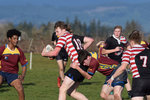

It may seem chaotic, hard-charging and sometimes brutal, but this contact sport with a lineage traced back to 1845 England continues to draw player interest and garner the support of parents, in large part, due to its emphasis of respect and community.
Rugby, aka rugby union, is built on a firm foundation of tradition. This focus is not lost on Frank Schmitt, parent of Prairie Wolf Pack player Gavin Schmitt.
“(Rugby is) probably the only sport where, if you do see a kid get tossed out of the game or ‘yellow carded’, you call the referee ‘sir,’ not ‘ref’ or names and, when you’re ‘red carded’, you will look at him and say ‘Thank you, sir.’” Schmitt said.
Schmitt was describing the stages of offenses in rugby, from warning to yellow card to red card, and how the players are taught to respect the role of the referee. This attitude plays out to the end when each team chooses a “man of the match” from the opposing team, that player is acknowledged with a coin or a T-shirt (usually the opposing team’s club T-shirt) and a snack or meal is shared together at the end of each game. So much for the barbaric reputation that rugby often suffers.
Locally, rugby consists of the Battle Ground Bulls and the Prairie Wolf Pack, two high school clubs made up of roughly 25 teammates or “ruggers.” According to Brush Prairie head coach John Fletcher, North County also supports a junior varsity club. He pointed out that youth interest has significantly increased in boys and girls as young as 3rd grade starting with flag rugby and graduating to tackling in the 7th and 8th grades.
At the high school level, there is also a varsity girls division. Regardless of the makeup, all local teams play under Rugby Oregon, the State Rugby Organization that oversees Oregon and SW Washington.
Fletcher, a native of New Zealand, says rugby came on the scene in North County about 12 or 13 years ago with one high school boys team representing multiple schools including Hockinson, Ridgefield, Heritage, Battle Ground, Prairie and La Center.
Playing rugby since he was five years old, Fletcher’s favorite aspect of the sport is its ability to accommodate a myriad of shapes, sizes and skill sets.
“In other high school sports, kids are sent away if they’re not good enough but that’s not the case with rugby. They may still be an average performer — that is the exception — but, in general, the kid that can’t make other sports teams would be able to participate (in rugby),” Fletcher said.
He went on to say that, even if that player doesn’t end the season as a standout player, Fletcher tracks the confidence building in every kid as a result of time spent on the field and being a part of a team.
Fletcher also sees the more relaxed training schedule as an attribute for students and parents, alike. Whereas football can easily consume 20 hours a week, the Prairie Wolf Pack trains twice a week in one-and-a-half- to two-hour increments.
As physical as rugby is, Fletcher stresses that it’s actually safer on many levels because ruggers do not wear padding, which can skew a player’s sense of vulnerability. When the players do impact one another, they both feel the force of the maul or tackle and it tends to keep unnecessary physical force at bay.
In rugby, greater attention is placed on the ball than an individual player and that focus translates to a coordinated team effort.
“In football, one guy gets the ball and runs it. In rugby, the team moves the ball down the field by running forward and pitching it backward,” Schmitt explained. “You gotta have four or five guys to pitch the ball back and forth to each other. One guy’s not gonna outrun 15 guys.”
Growing up on rugby, Fletcher thinks it’s unfortunate that rugby is not on the radar of more Americans, especially considering that the U.S. team is currently ranked #1 in the world for World Rugby Sevens — a fast-paced version consisting of teams of 7 instead of 15. He sees Team USA as “a serious threat rolling into the next Olympics.”
On the high school front, Fletcher is passionate about encouraging an interest in rugby and stressing its traditions.
“You’ve gotta be on time, be respectful, be a good team mate, work hard, be a good winner, be a good loser. There are so many traits that kids derive from rugby that set them up for life,” Fletcher said.
{{tncms-inline content="<p class="p1"><span class="s1">In this three-part series, The Reflector explores rugby&rsquo;s growing popularity in the Battle Ground area and the impact it is having.</span></p>" id="7beb83a0-27f0-472b-8858-6cf8b93b34c0" style-type="bio" title="Rugby Rising" type="relcontent"}}